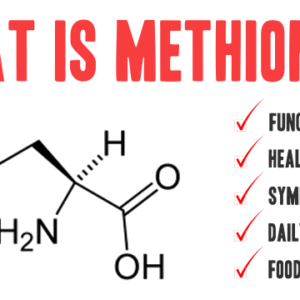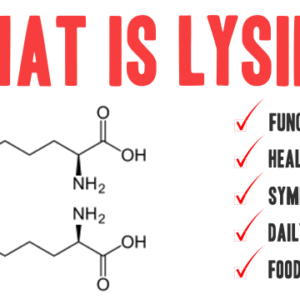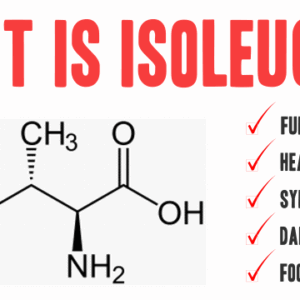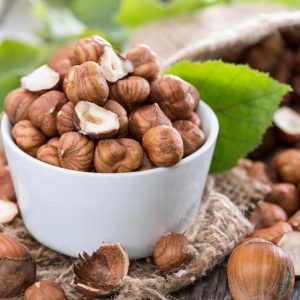What Is Leucine?
Leucine is one of the nine essential amino acids that the human body cannot produce on its own. It must be obtained from food or supplementation. It is also one of the three branched-chain amino acids (BCAAs), alongside isoleucine and valine, known for their crucial roles in muscle metabolism.
Among the BCAAs, leucine is the most potent stimulator of muscle protein synthesis, making it a key nutrient for anyone focused on muscle repair, athletic performance, or preventing age-related muscle loss (sarcopenia).
Key Functions of Leucine in the Body
1. Stimulates Muscle Protein Synthesis (MPS)
Leucine activates the mTOR (mammalian target of rapamycin) pathway, a critical regulator of muscle cell growth and repair (Atherton et al., 2010).
This activation enhances the body’s ability to build and maintain lean muscle mass, particularly when consumed after exercise or with dietary protein.
2. Preserves Muscle Mass During Caloric Restriction
In both athletes and individuals on calorie-restricted diets, leucine helps maintain muscle mass while promoting fat loss by encouraging the body to burn fat rather than muscle tissue.
3. Supports Wound Healing and Tissue Repair
Leucine is required for the regeneration of skin, muscle, and other tissues, making it valuable for post-surgery recovery and healing from injuries.
4. Regulates Blood Sugar Levels
Leucine helps regulate glucose uptake and insulin sensitivity by influencing cellular energy metabolism, especially in muscle and liver tissue (Zhang et al., 2007).
5. Boosts Endurance and Reduces Muscle Fatigue
During extended exercise, leucine can be used by muscles as an energy source, helping delay fatigue and supporting performance in endurance sports (Shimomura et al., 2006).
Health Benefits of Leucine
Promotes muscle hypertrophy and strength
Enhances muscle recovery after resistance training
Helps prevent sarcopenia in older adults
Aids in fat loss while preserving lean mass
Supports blood sugar balance and metabolic health
May assist in recovery from surgery or injury
Daily Requirements and Dosage
The World Health Organization (WHO) recommends a minimum daily intake of:
39 mg of leucine per kg of body weight per day
For a 70 kg (154 lb) adult, this equals about 2,730 mg/day.
Higher intakes may be needed for:
Athletes
Older adults
People in recovery from injury or surgery
Individuals with muscle-wasting conditions
Signs and Symptoms of Leucine Deficiency
Though uncommon in healthy individuals with adequate protein intake, deficiency may occur with:
Chronic malnutrition
Severe illness
Liver disease
Genetic disorders (e.g., Maple Syrup Urine Disease)
Symptoms may include:
Muscle wasting
Poor wound healing
Low energy and fatigue
Hypoglycemia (low blood sugar)
Neurological issues (in severe cases)
Food Sources of Leucine
Leucine is abundant in high-protein foods, especially from animal sources. It’s also present in select plant-based foods.
Top Leucine-Rich Foods:
| Food | Serving Size | Leucine Content |
|---|---|---|
| Chicken breast | 3 oz (85g) | ~2,700 mg |
| Eggs | 2 large | ~1,100 mg |
| Tuna | 3 oz (85g) | ~2,200 mg |
| Greek yogurt | 1 cup | ~1,300 mg |
| Tofu | ½ cup | ~1,000 mg |
| Lentils | 1 cup cooked | ~1,300 mg |
| Soybeans (edamame) | 1 cup | ~2,500 mg |
| Whey protein | 1 scoop (25g protein) | ~2,500–3,000 mg |
Leucine Supplementation
Leucine supplements are often taken:
On their own (as free-form leucine)
In BCAA blends
In protein powders, especially whey isolate
Typical Dosage:
2–5 grams per day is effective for stimulating muscle protein synthesis, especially post-workout.
Best Timing:
Immediately post-exercise, particularly when consumed with carbohydrates and other amino acids.
Safety:
Leucine supplementation is generally safe, though excessive intake (>10–15 g/day) over long periods may:
Strain kidneys in those with pre-existing kidney issues
Interfere with other amino acid absorption (e.g., isoleucine, valine)
Always consult a healthcare provider before starting supplementation, especially if pregnant, nursing, or managing a medical condition.
Research and Clinical Applications
Muscle Wasting and Sarcopenia: Studies show leucine can help maintain or restore muscle mass in older adults.
Burn Recovery: High-leucine diets have been used in clinical settings to promote recovery from severe burns and injuries.
Metabolic Health: Leucine influences insulin signaling and may improve glucose regulation in those with metabolic syndrome or type 2 diabetes.
Conclusion
Leucine is more than just a building block of muscle—it’s a metabolic powerhouse. Its unique ability to activate the mTOR pathway makes it essential for muscle protein synthesis, while also supporting immune health, glucose metabolism, and tissue repair.
Whether you’re an athlete, aging adult, or recovering from illness, optimizing leucine intake—through diet or supplementation—can be a strategic move for health, performance, and longevity.
References
Atherton, P. J., & Smith, K. (2010). Muscle protein synthesis in response to nutrition and exercise. The Journal of Physiology, 588(Pt 1), 105–113.
Zhang, Y., et al. (2007). Leucine supplementation improves insulin sensitivity in rats. Diabetes, 56(6), 1647–1654.
Shimomura, Y., et al. (2006). Branched-chain amino acid supplementation before squat exercise reduces muscle soreness. International Journal of Sport Nutrition and Exercise Metabolism, 16(6), 620–635.
Volpi, E., et al. (2003). Essential amino acids stimulate muscle protein synthesis in older adults. The American Journal of Clinical Nutrition, 78(2), 250–258.
- Leucine signaling in the pathogenesis of type 2 diabetes and obesity: https://pmc.ncbi.nlm.nih.gov/articles/PMC3310004/
- Leucine Supplementation: A Novel Strategy for Modulating Lipid Metabolism and Energy Homeostasis: https://pmc.ncbi.nlm.nih.gov/articles/PMC7282259/









